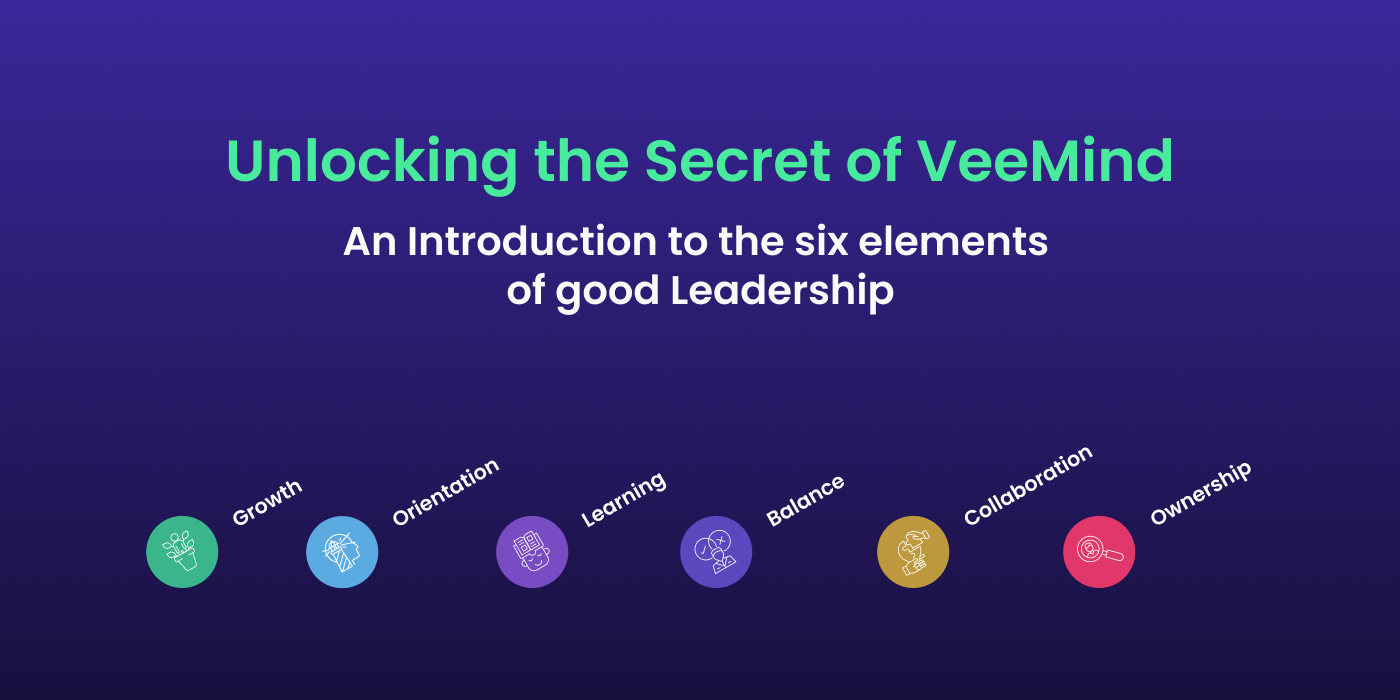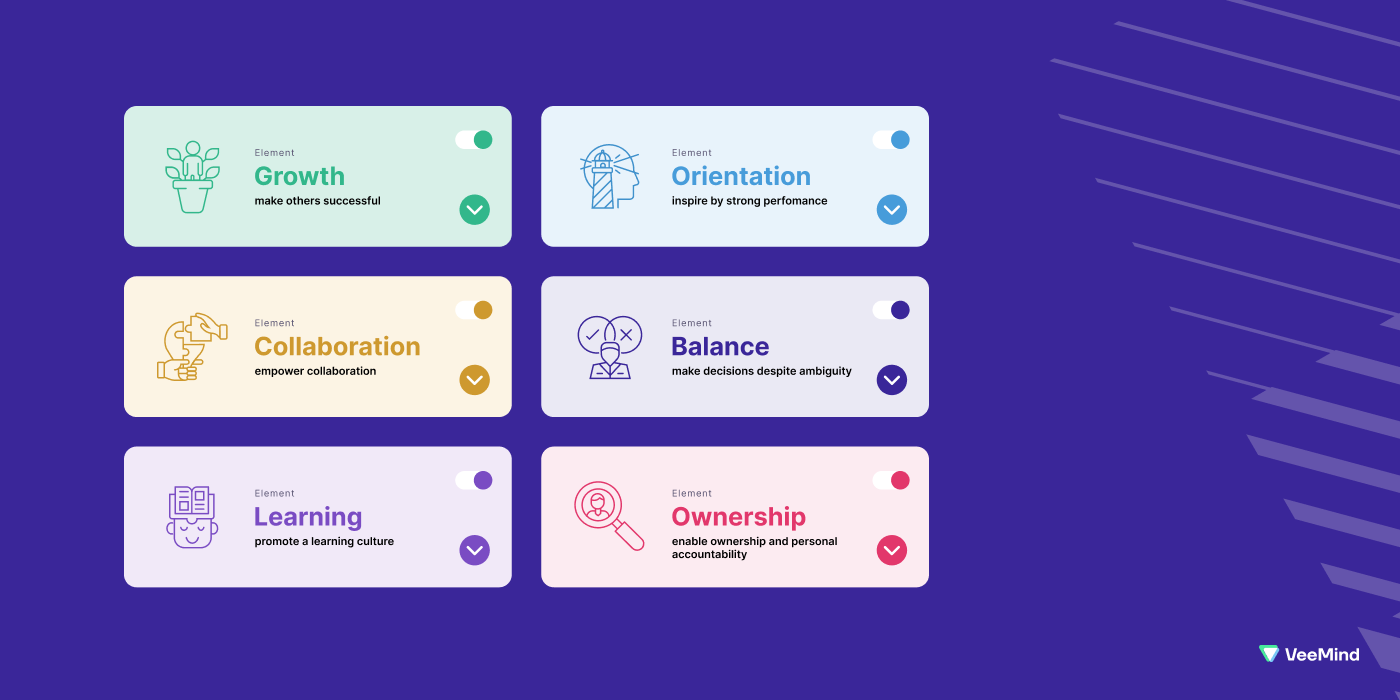Unlocking the Secret of VeeMind: An Introduction to the Six Elements of Good Leadership

Unlocking the Secret of VeeMind: An Introduction to the Six Elements of Good Leadership
Good leadership is often elusive. We all know that certain leaders just seem to have “it,” that intangible quality that enables them to inspire their teams to greatness. But what is “it,” exactly? And can anyone learn to be a great leader?
Have you ever wondered how many elements are necessary to define great leadership? Some might argue that there are just a few, while others might suggest a long list. VeeMind has identified six key elements of great leadership: Orientation, Growth, Collaboration, Balance, Ownership and Learning. These elements have been field-tested and refined to provide leaders with a comprehensive framework to become the best version of themselves.
At VeeMind, we believe that effective leadership can be learned and developed. That’s why we’ve created a comprehensive framework for leadership development, based on the six key elements of good leadership and we are providing you a powerful tool for assessing and improving your leadership skills.
In this article, we’ll explore each of these six elements in detail, define why they are essential for effective leadership and how they can be developed and improved. By the end of this article, you’ll have a deeper understanding of what it takes to lead a successful organization and how VeeMind can help you improve your leadership skills.
Good leadership can be defined as the ability to inspire, motivate, and guide a team towards achieving a common goal. A good leader not only has a clear vision and strategy for the organization but also has the ability to communicate that vision and strategy effectively to their team. Good leadership is also characterized by strong interpersonal skills, the ability to build and maintain relationships, and a willingness to listen to and consider diverse perspectives. A good leader is able to identify and develop the strengths of their team members, as well as provide constructive feedback for areas of improvement. Ultimately, good leadership is about creating a culture of excellence, where team members feel valued, motivated, and supported in their efforts to achieve their individual and collective goals.
In this article, we’ll introduce you to these six elements and explain how they work together to create great leadership.

Orientation
Orientation is all about inspiring through strong performance. Good leaders set high standards for themselves and their teams, and they lead by example.
When you are confident in your abilities, you inspire confidence in others. Your team looks to you for guidance and direction, and if you are uncertain or hesitant, it can undermine their confidence in you. Confidence doesn’t mean you have all the answers, but it does mean that you trust in your abilities to find solutions and make good decisions.
As a leader, you need to have a clear vision of where you want your team or organization to go, and the drive to make it happen. Your ambition inspires your team to work towards a common goal, and it gives them a sense of purpose and direction. A lack of ambition can lead to complacency and a lack of motivation among your team.
Your presence as a leader is the way you carry yourself, how you communicate, and how you interact with others. A strong presence commands attention and respect, and it creates an environment of trust and open communication. It’s about being fully present in the moment and demonstrating a genuine interest in the people around you.
Growth
The element of Growth in good leadership pertains to continuous improvement and development, both for the leader and the team. Appreciation, goal setting, and empathy are three critical skills that contribute to fostering growth within an organization.
Appreciation involves acknowledging the efforts and contributions of individuals and teams, which creates a positive and motivating work environment. Leaders who demonstrate appreciation can inspire their team members to continue to work hard and strive for excellence.
Goal setting involves identifying clear and achievable objectives for the team and providing the necessary resources and support to help them achieve these goals. Leaders who are skilled in goal setting can help their team members see the big picture and understand how their individual efforts contribute to the overall success of the organization.
Empathy is the ability to understand and relate to the feelings and experiences of others. Leaders who practice empathy can create a culture of trust, support, and collaboration within their organization. They can also provide the necessary support and resources to help their team members overcome obstacles and achieve their goals.
Collaboration
Collaboration is the key to success in every organization and an essential element of good leadership that enables teams to achieve their goals effectively. It involves creating a culture of teamwork, where individuals work together towards a common objective, leveraging their diverse skills and perspectives to produce innovative solutions.
Good leaders are open for dialogue and have the ability to communicate effectively with team members by actively listening to their perspectives and providing feedback in a constructive manner. By creating a safe space for open dialogue, leaders can ensure that all team members feel valued and their contributions are considered.
Effective collaboration requires a balance between structure and freedom. Leaders must provide a clear framework that outlines the team’s objectives, timelines, and roles, while allowing enough flexibility for team members to bring their unique ideas to the table. This skill helps leaders strike the right balance, creating an environment where collaboration thrives.
Leaders must be able to foster a sense of camaraderie within the team, creating an environment where team members can trust and rely on each other. This skill requires leaders to actively encourage team-building activities and create opportunities for team members to bond outside of work.
Balance
Good leadership refers to the ability to balance competing demands and make decisions that align with the organization’s values and goals.
A good leader must be decisive, able to make tough decisions under pressure and balance competing demands. This skill requires a clear understanding of the organization’s goals, values, and priorities, as well as the ability to analyze complex information and make informed decisions.
Leaders should be open and honest with their teams, sharing information about decisions and actions that affect the organization. Transparency helps build trust and fosters a culture of accountability, which is essential for achieving balance.
Great leaders must communicate decisions and actions in a way that is understandable to everyone in the organization. This requires clear and concise communication skills and the ability to explain complex information in a way that is accessible to all. By making information comprehensible, leaders can ensure that everyone understands the organization’s goals, values, and priorities, which is essential for achieving balance and driving success.
Ownership
Ownership is all about taking responsibility for one’s actions and decisions. Good leaders are accountable to themselves and to their teams, and they take ownership of their successes and failures.
Good leaders who take ownership know how to listen actively to their team members. They encourage open communication and create a space where everyone feels comfortable sharing their ideas and opinions.
Leaders who take ownership also take responsibility for the success and failures of their team. They hold themselves accountable for their actions and are not afraid to admit when they have made a mistake. They also hold team members accountable for their actions and the results they deliver.
Leaders who take ownership are committed to seeing a project or task through to the end. They understand that there will be challenges along the way, but they remain determined to overcome them and deliver results.
This fosters an environment of trust, respect, and high-performance, which leads to greater success for the organization as a whole.
Learning
Effective leaders are always learning, both from their successes and their failures. They are open to feedback and willing to make changes when necessary.
This element is about fostering a culture of continuous learning and growth, both for yourself as a leader and for your team.
A good leader recognizes that they don’t have all the answers and actively seeks out new ideas and perspectives from others. They listen to their team’s feedback and ideas, and create an environment where people feel comfortable sharing their thoughts and opinions.
It’s important to create a psychologically safe environment where people feel free to take risks, make mistakes, and learn from them. Leaders should encourage their team to experiment, try new things, and learn from failures without fear of punishment or retribution.
Great leaders take their time to reflect on their own performance and seek out feedback from others. They use this feedback to identify areas for improvement and set goals for growth. By modeling a commitment to learning and self-improvement, leaders can inspire their team to do the same.
At VeeMind, we believe that great leadership is not about being born with a certain set of skills or qualities. It’s about learning and developing the skills and qualities that enable you to lead effectively. With our comprehensive framework for leadership development, we can help you unlock the secret of great leadership and achieve your full potential as a leader.
By signing up for VeeMind Nano, you can start your journey towards becoming a better leader and unlocking the full potential of you and your team.
Don’t wait any longer to improve your leadership skills - try VeeMind Nano today and see the difference it can make.


